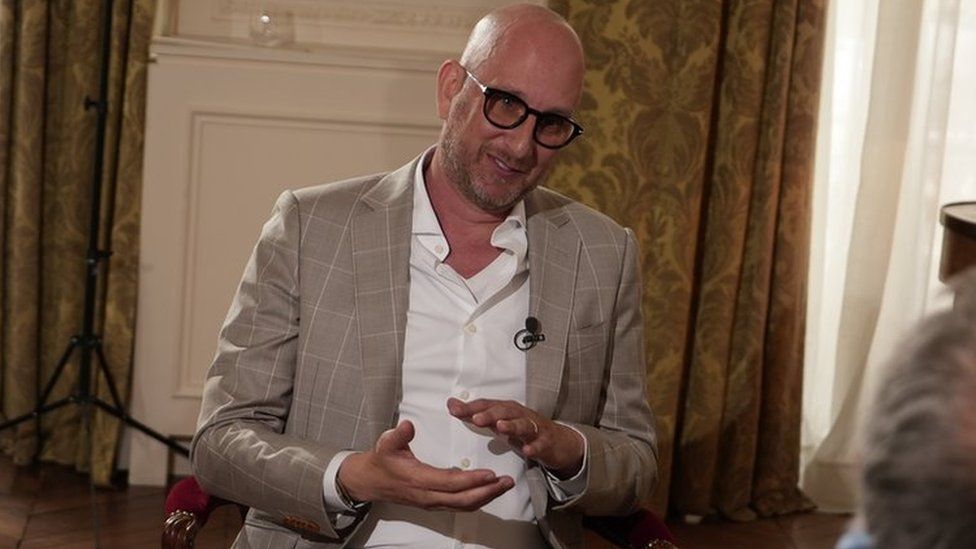ARTICLE AD BOX

By Nick Thorpe
BBC News Eastern Europe correspondent
"It's good to have an enemy," says George Birnbaum, one of the godfathers of modern populism. "Very rarely will you find someone who's loved by everybody."
A political consultant for 30 years, he helped Benjamin Netanyahu come to power in a surprise victory in Israel in 1996, and Hungary's Viktor Orban in 2010.
He has clients in many countries, and flits nowadays between New York, Dubai and Harare.
George Birnbaum built his reputation as one of "Arthur's kids" - under mentor and late business partner Arthur Finkelstein, a brilliant mathematician who re-invented the art of political campaigning in the US, helping Richard Nixon to power in 1972, as well as many other Republican leaders.
"One should…try to polarise the election around that issue that cuts best in your direction, i.e. drugs, crime, race in New York State…," Finkelstein wrote in a 1970 memo. "When the opponent seizes the polarisation initiative, then you're in trouble."
The duo scored a dramatic upset with Benjamin Netanyahu's first election victory in Israel, which came just months after the assassination of incumbent PM Shimon Peres's predecessor Yitzhak Rabin.
Voters were electrified by slogans such as "Peres will divide Jerusalem" - in peace talks with the Palestinians.
"'Whether or not it would have been a line down the middle of Jerusalem, I don't think that's true," he admits today. "But there were certain areas of the municipality…that were discussed as being given to the Palestinian Authority as part of a peace deal."
Image source, George Birnbaum
Image caption,A younger George Birnbaum (L) helped orchestrate Benjamin Netanyahu's electoral campaign 27 years ago
In 2008, they began work for Hungary's Viktor Orban, whose right-wing Fidesz party won a landslide victory in 2010.
Three years later, with more elections on the horizon, the decision was taken: Viktor Orban needed a new enemy - a man Hungarians could be told to fear.
After copious opinion surveys, the duo struck on George Soros, the then 85-year-old Hungarian-born US billionaire and philanthropist, as a perfect target. Viktor Orban has vilified him ever since.
"George Soros was a good target," George Birnbaum tells me,
"Because enough people in Hungary didn't like the idea of this billionaire behind the curtain, almost like… the Wizard of Oz, controlling politics and policy."
Image source, Getty Images
Image caption,US billionaire philanthropist George Soros has in recent years become the focus of anti-Semitic conspiracies
In 2015, the year George Birnbaum stopped working for Viktor Orban, the Hungarian prime minister discovered a new enemy: Muslim migrants.
And when in September that year George Soros suggested the EU should absorb large numbers of asylum seekers, the Hungarian leader was quick to signal "a Soros plan".
However implausible, the Jewish philanthropist was accused of a plot to destroy Christian Europe with Muslim immigrants - an idea already gaining ground on the far-right fringes of European politics as "the Great Replacement theory".
Migrants became the feared "other" in the world-view of many Hungarians, replacing Jews or Gypsies. And the demonisation of George Soros radiated from Hungary, around the globe.
"Don't be afraid to call your enemies by their name. They will never show mercy. Consider for a moment George Soros," Viktor Orban told Republicans at the Conservative Political Action Conference (CPAC) in the US state of Texas in 2022.
"I know George Soros very well. He is my opponent. He believes in none of the things that we do," the Hungarian leader told his American hosts.
Image source, Reuters
Image caption,Hungary's Viktor Orban addressed American conservatives in Texas last year
George Birnbaum's wife is Ukrainian, and the couple visit Ukraine often - as close friends of Kyiv mayor Vitali Klitschko.
I point out that Russia's Vladimir Putin - who sent troops into Ukraine last year - has said that liberalism has become obsolete. The Russian leader loses no opportunity to rail against the decadence of the liberal West, multiculturalism, immigration, and human rights.
Isn't that the West which Ukraine is trying to join? Which George Soros believes in?
The war in Ukraine, George Birnbaum says, "has reminded us why freedom matters, and why democracy matters".
If he met George Soros in the street he would invite him for a drink, he says. "We disagree on a lot of things… But I would like to find out where are the places that we see the same future for Western democracy, for liberal democracy."
"I have a problem with the extremes on both sides, whether it's the progressive liberalism of the left or the extreme right-wing isolationist conservatism that exists on the right now."
As for Viktor Orban, nearly a decade has passed, he says, since they last spoke. He admired him when they first met as "a very intellectually smart individual, someone who had a deep knowledge of the economy, and other areas of policy… and that's rare".
Now he believes Viktor Orban has been in power too long.
In January 2015, the Hungarian leader suggested that "every migrant is a potential terrorist". By July 2022, he had told supporters that "we are willing to mix with one another, but we do not want to become peoples of mixed-race".
Image source, Reuters
Image caption,Viktor Orban's anti-immigrant message has struck chords in Hungary - which saw an influx of migrants and refugees in 2015
George Birnbaum disagrees strongly with both statements.
His critics argue he foments polarisation in politics - but what is the antidote to this?
"The best kind of leaders are those who remind us of common goals, and not of our differences. It's not about ideology, it's about making sure that people's hopes and dreams are realised," he says.

 1 year ago
30
1 year ago
30








 English (US)
English (US)